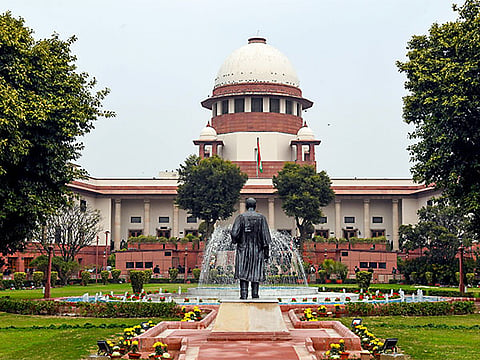

NEW DELHI: Supreme Court on Wednesday reserved its verdict on the West Bengal government's suit alleging that the CBI is pressing ahead with investigation into post-poll violence cases in the state, without securing its prior nod as per the law.
A two-judge bench of the top court, led by Justice B R Gavai and Justice Sandeep Mehta, reserved its verdict after hearing detailed arguments from WB government and Centre.
The Centre, through its senior lawyer, Solicitor General (SG) Tushar Mehta, told the apex court that a state government cannot claim right to issue omnibus, sweeping, and overarching directions to withdraw consent for a CBI probe into any matter.
"The state government can exercise the power to grant/refuse consent only on a case-to-case basis only," Mehta said and sought that the WB government's plea should be dismissed by the SC.
It is to be noted that the CBI has lodged multiple FIRs in cases of post-poll violence in West Bengal, while the state government had vehemently objected to it.
Mehta also raised a preliminary objection on the lawsuit filed by the West Bengal government and said that the state's original suit was not maintainable.
"The CBI is an independent body and not the one coming under the Central government. Therefore, the Central government cannot be sued in the matter," Mehta told the top court.
He further accused the West Bengal government of trying to litigate the same issue in two different cases before the apex court.
The Bench was hearing arguments in an original suit filed by the West Bengal government against the Centre over the alleged misuse of CBI in matters concerning the State.
Opposing the arguments of Mehta, senior lawyer Kapil Sibal, who appeared for WB government, told the top court that the CBI could not probe cases concerning West Bengal without the State government's general consent.
Raising questions on how the CBI can probe cases within its territory without the concerned state government's prior sanctions, Sibal said, "We are dealing with a statute (Delhi Special Police Establishment Act) that impacts the federal structure of this country. General Consent is necessary before you get entry in the State," Sibal said.
He also pointed out that once a foothold is given to the CBI in a State, soon after, the ED also entered for investigating the predicate offence. "It has huge ramifications on the polity of this country. All of this has enormous implications for the Indian polity," the senior lawyer said.
The State government in its plea said that it had filed the plea in the top court against the Centre under Article 131 of the Constitution, which empowers a State to move the Supreme Court directly in case of a dispute with the Centre or any other State.
It is to be noted that the WB government had on November 16, 2018, withdrawn the general consent accorded to the CBI to conduct probe and raids in the State.
The West Bengal government has filed the original suit in the apex court against the Centre also under Article 131 of the Constitution, alleging that the CBI has been filing FIRs and proceeding with its probe, despite the state having withdrawn the general consent to the federal agency to probe cases within its territorial jurisdiction.
Article 131 of Indian Constitution deals with the Supreme Court's original jurisdiction in a dispute between the Centre and one or more states.